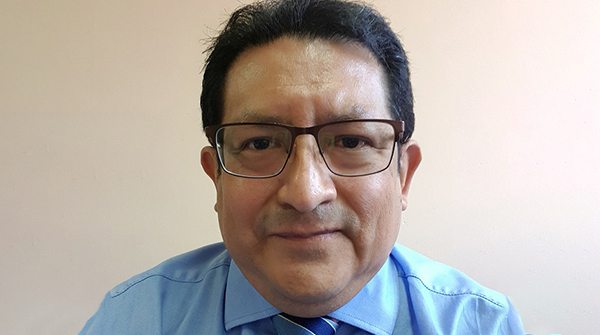
Benjamin Acosta was born in Mexico and currently has served as the head of the Medical Department in the Coordinacion de Vigilancia Epidemiologica at the Instituto Mexicano del Seguro Social (IMSS) in Mexico City for the last 17 years. He is certified by the Consejo Nacional de Salud Publica of Mexico and the National Board of Public Health Examiners, and was elected Fellow of the American College of Epidemiology in 2016. He received his medical degree from the Universidad Nacional Autonoma de México, his medical specialty degree as epidemiologist from the Instituto Mexicano del Seguro Social de México, his education specialty degree from the Universidad La Salle, and his PhD in epidemiology from Pitt Public Health in 2015. In 2019, Acosta was included as member of the National System of Researchers of Mexico.
In 2002 the national authorities of the Mexican Institute of Social Security started the strategy called Integrated Health Programs to change the traditional focus of health programs from a prevention of specific diseases and risks, to a protection of the health of population groups. Acosta was designated the leader for the design, planning, and execution of a system of health institutional surveys that complemented the usual information systems.
Acosta applied some strategies to achieve reliable results on time. Several efficient procedures were implemented for sampling, field work, data entry, analysis, and final report. Adequate planning and supervision allowed four national surveys to be carried out several years. In 2003, 797,797 participants were included; 117,884 in 2004; 122,380 in 2005 and 117,037 in 2006. A team of 1,400 interviewers visited 157,500 houses and interviewed 437,097 participants face-to-face during the four studies. The studies always measured the coverage of preventive actions such as vaccination, health education activities, and utilization of health services, among others. Additionally, in different years it measured the national prevalence of type 2 diabetes mellitus, high blood pressure, high cholesterol, obesity, physical activity, drug use and depression, among others. These studies are among the largest in Mexico. Several documents, news stories, books, and scientific papers have been published about the studies.
Of his research, Acosta says, "The application of the epidemiological method to everyday problems is something that pleases me and creates challenges for me. I enjoy my work because most of the time I have been involved in the analysis of morbidity and mortality data, in the research of health problems from the epidemiological perspective, and in teaching physicians who are in the training of a medical residency in epidemiology."
Acosta has been professor of the medical residency course in epidemiology for 13 years at the IMSS. Under his direction this course was evaluated to be included in the National Quality Postgraduate Program of the National Council of Science and Technology of Mexico (CONACYT) in 2017. This was the first and so far, it is the only medical residency course in epidemiology included in this quality program in Mexico. He has been thesis advisor more than 15 times and has participated in more than 30 final exams for medical epidemiologists. He has participated in the design of epidemiology exams for the Consejo Nacional de Salud Publica of Mexico, Universidad Nacional Autonoma de México and the National Board of Public Health Examiners.
Acosta summarizes his time at Pitt Public Health and how it impacted his career in two main ways: improved research and epidemiological skills and motivation from teachers and colleagues. "The interaction I had with very bright teachers and colleagues with extraordinary abilities motivated me to think about doing great things in epidemiology in the future when I return to my country. Ron LaPorte's efforts have also been my inspiration to do important projects."
Acosta has received several awards for his work as both researcher and professor. He has been a reviewer for some medical journals and participated in several research committees. He has given epidemiology interviews for the newspapers, radio, TV, and the web-based outlets.
Read coverage in Pittwire: Alum’s Extensive Data Work Helps Hispanic Health
11/17/2020